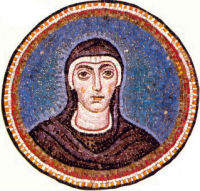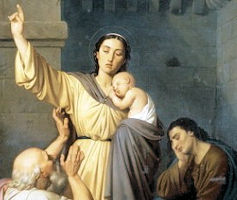Lent: March 7th
Thursday of the Third Week of Lent; Optional Memorial of Sts. Perpetua and Felicity, Martyrs
Other Titles: St. Felicitas
» Enjoy our Liturgical Seasons series of e-books!
Today, the mid-point of Lent, was celebrated with somewhat joyful spirit in ancient times. This day was a breathing space in the center of Lent’s austerities. Today’s ancient Entrance Antiphon and Opening Prayer express this encouraging spirit. Modern Lent is less austere, less in need of any breathing space. Today’s lesson: be faithful to God, and do not ever fall away. It is a lesson to strengthen us for the remainder of Lent. —The Vatican II Weekday Missal
The Church celebrates the Optional Memorial of Saints Perpetual and Felicity (d. 203). The account of their martyrdom forms one of the finest pages of the history of the first centuries of the Church. It shows us clearly the wonderful sentiments of these two women when they heard that they had been condemned to the wild beasts. Knowing their own weakness but relying on the strength of Christ, who was fighting with them, they went to their martyrdom as to a triumphant celebration, to which they were invited by Christ. They were exposed to the fury of wild beasts in the amphitheater at Carthage, A.D. 203, and finally killed by the sword. Their names are still mentioned together in the Roman Canon of the Mass.
Meditation on the Liturgy
The Gospel shows us Jesus at grips with Satan; He overcomes him and drives him from the body of one possessed. From the beginning of His ministry Jesus was pitted against Satan; at the time of His passion He entered on the final combat but victory was assured to Him: "For the prince of this world cometh, and in Me he hath not anything." Our Lord Himself summed up His whole work as the definitive victory over Satan: "Now shall the prince of this world be cast out. And I, if I be lifted up from the earth, will draw all things to Myself."
Thus our Lord's whole mission is set before us as a struggle with, and a victory over, Satan. During Lent the Church could not fail to emphasize this. At the outset, on the 1st Sunday, she appointed for the Gospel the account of the temptation in the desert and we have already seen its real significance. Today, cast out from the body of one possessed, Satan finds that he has lost all the kingdom that he had seized. As the passion and the baptisms of Easter draw nearer it is made clear to us that after the exorcisms pronounced over the catechumens will come the taking possession by Christ of the human souls whom He has redeemed.
The struggle against Satan goes on in our lives as baptized members of the Church. Humanity, so long as it knew not Christ, was deaf and dumb and the devil's prey; but once open to the light of our Savior it can fix its gaze on Him, and strong in His grace, begins on new ways, far from the darkness of sin.
—St. Andrew Daily Missal
Sts. Perpetua and Felicity
 Vibia Perpetua, a well-to-do young woman and mother, and Felicitas, a slave who gave birth to a child three days before suffering a martyr's death, were catechumens. Against such prospective converts the persecution of Septimius Severus was particularly severe. These two holy women suffered death on the seventh of March in Carthage. The Breviary relates the following touching episode:
Vibia Perpetua, a well-to-do young woman and mother, and Felicitas, a slave who gave birth to a child three days before suffering a martyr's death, were catechumens. Against such prospective converts the persecution of Septimius Severus was particularly severe. These two holy women suffered death on the seventh of March in Carthage. The Breviary relates the following touching episode:
Now the day had arrived when they were to be thrown to the wild beasts. Felicitas began to be sorrowful because she feared she would have to wait longer than her companions. For eight months she had been pregnant and therefore, according to Roman law, could not be executed before the birth of the child. But the prayers of her fellow sufferers hastened her time and she gave birth to a baby girl.
While she was suffering from the pains of childbirth, one of the guards called out to her, "If you are suffering so much now, what will you do when you are thrown to the wild beasts?" "Now I suffer," she answered, "but there Another will be in me, who will suffer for me, because I will suffer for Him." When she was in travail she had sorrow, but when she was set before the wild beasts she rejoiced (Martyrology).
Finally, on the seventh of March, these heroic women were led into the amphitheater and severely scourged. Then they were tossed about by an exceptionally wild cow, gored, and thrown to the ground.
—Excerpted from The Church's Year of Grace, Pius Parsch
Patronage: Perpetua—Cattle; ranchers; death of children; martyrs; married women; Carthage, Tunisia; Santa Perpètua de Mogoda, Catalonia, Spain
Felicity—Cattle; ranchers; death of children; martyrs; sterility; to have male children
Symbols and Representation: Perpetua—cow; woman with a sword beside her; woman with a bull, ox, leopard or lion in an amphitheater; Seven swords; cauldron of oil and sword; sword with seven heads; eight palms
Felicity—bull; cow; pregnant woman holding a cross; woman with a sword by her; woman with a bull or ox in an amphitheater
Highlights and Things to Do:
- The story of the sufferings of today's saints is preserved for us in authentic "Acts of the Martyrs" that were composed partly by the saints themselves, and partly by eyewitnesses (perhaps Tertullian). The account may be classed with the most beautiful portions of ancient Christian literature that have come down to us. Read CIN's account.
- Read about the locations of their relics.
- Read more about Sts. Perpetua and Felicity:
- Watch Sts. Perpetua and Felicity.
- Listen to Catholic Culture's Way of the Father's podcast, Ep. 15—Perpetua: A Rare Female Voice from Antiquity by Mike Aquilina.
- Listen to Catholic Culture's Audiobook Tertullian—The Martyrdom of Perpetua and Felicity by James Majewski.






